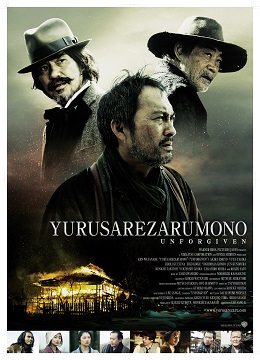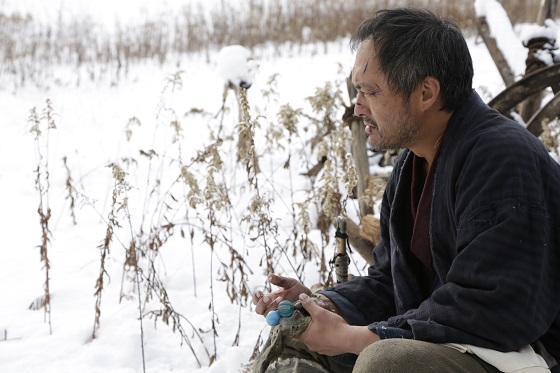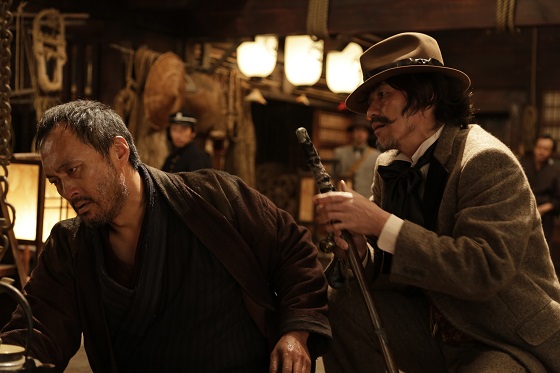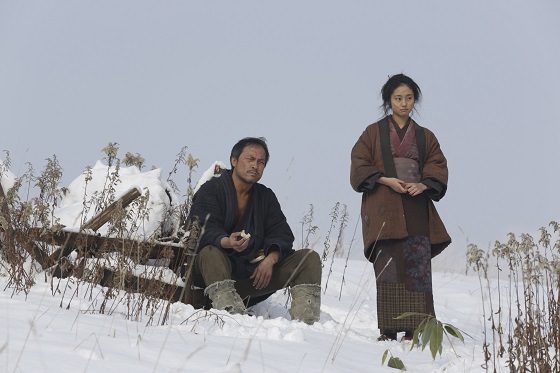[Rock Fist Way Up]
 European and American filmmakers have been ripping off Japanese cinema with such ruthless consistency and unapologetic aplomb that it seems fitting that someone there would eventually return the favor in spades. That’s precisely what’s happened with Sang-il Lee’s reimagining of Clint Eastwood’s groundbreaking opus, Unforgiven. Interestingly enough, this more or less completes the circle Mr. Eastwood and Sergio Leone started when they made Fistful of Dollars, a European re-imagining of a Japanese story that seamlessly transitioned its characters and setting from the Tokugawa Shogunate era to the mid-to-late 19th century American “West.”
European and American filmmakers have been ripping off Japanese cinema with such ruthless consistency and unapologetic aplomb that it seems fitting that someone there would eventually return the favor in spades. That’s precisely what’s happened with Sang-il Lee’s reimagining of Clint Eastwood’s groundbreaking opus, Unforgiven. Interestingly enough, this more or less completes the circle Mr. Eastwood and Sergio Leone started when they made Fistful of Dollars, a European re-imagining of a Japanese story that seamlessly transitioned its characters and setting from the Tokugawa Shogunate era to the mid-to-late 19th century American “West.”
And while Lee’s Unforgiven reboot probably won’t have the same cultural and cinematic impact as Leone’s first spaghetti western, the Japanese remake of what is widely regarded as Clint Eastwood’s finest work is nothing less than breathtaking. The thematic connections between the two periods and the characters involved are plain enough to recognize, yet the Japanese version of Unforgiven (Yurusarezaru mono) isn’t just a remake, it is a unique exploration of a very poignant story that crosses cultural lines and speaks to a series of basic human truths.
In westerns, as in samurai movies, people are usually killed in droves by steely-eyed killers whose most notable characteristics are their speed, accuracy, and combat-infallibility. Since these movies are almost always anchored by some noble quest, or a back-and-white division of good vs. evil, one finds that little time is afforded to explorations of who died, whether they truly deserved it, and what impact these acts had on those pulling the trigger/thrusting a sword. A post-modern western in the truest sense of the word, Clint Eastwood’s 1992 production of Unforgiven was more or less exclusively devoted to these questions, and forced its audience to consider them as well.
Not content to just make a movie that echoes the same plot points as Eastwood’s picture, Lee’s Unforgiven thoughtfully explores all of these same issues within the historical context of Japan’s transition out of the Shogunate era. The themes at work in Eastwood’s masterpiece are all at play in the Japanese reboot, for in Jubei (Ken Watanabe, in Eastwood’s original role), the intrinsic nature of the original William Muney character is left intact. Similar to Eastwood’s portrayal in the 1992 film, Jubei is a man running from his past, and the demons that take up residence there. A retired samurai living in a world that still fears, yet holds no respect for such a man, the broke, widowed father of two finds himself rethinking his vow to renounce violence when a murder-for-hire gig lands in his lap.
This job is a contract killing of two farmers who visited a small town brothel and cut up one of the working girls there; although he struggles with the moral dilemma of killing again, the picture sets Jubei up as a man who, at least in the past, has done far worse with far less justification. There are a number of complex factors at play in this story, its examination of “justice” perhaps the most poignant. The charming little corner of the world where the prostitute was cut is policed by a vicious constable, Ichizo (Kôichi Satô, in Gene Hackman’s role), whose idea of justice is no less violent or ugly than what Jubei’s wrath promises to bring. The entire dilemma kicked off because a drunken farmer thought himself justified in cutting up a prostitute after she giggled at his small package. The owner of the brothel thought the revenue lost as a result of the sliced-up woman demanded financial compensation: his justice balanced by the delivery of horses to compensate for that lost income.
Everyone in Unforgiven thinks that they are acting in the name of justice, but all they are really doing is perpetuating a cycle of exploitation, cruelty, and murder that largely defined the era for Americans and Japanese alike. Lee’s film captures the essence of this so well, and so completely, that one can sometimes find themselves forgetting that this is a remake, and not an original work. Indeed, the transition of the story into a Japanese setting is done so well, and the film’s pacing, look, and action is so crisp, that this version can easily stand on its own, without comparisons.
Yet make no mistake about it: Lee’s Unforgiven is the same movie as Eastwood’s insofar as one house with an identical design is the same as another thousands of miles away. These homes may have the exact same layout of rooms, with all the doors and windows right where the others are, yet they are painted differently, have different interior designs, and bear the mark of two different landscapers. Although one scene may be added here, or another dropped there, both movies go through the same plot and character paces, and even share a few similar shots that are obvious nods to the original’s mastery. In the end, the Japanese remake accomplishes what so many movies have tried but failed to achieve: it retains all of the crucial components that made the original a masterpiece, yet courageously deviates where necessary so that it tells a unique story.
The end result is a stunning tour through a newly-built Japanese “home” that has all the same designs features of the original, but new furniture pieces and backyard amenities more fitting to an Asian (versus American) setting. This doesn’t make one home better than the other, no. Rather, it allows for a heightened experience for a guest savvy enough to appreciate how each domicile compliments its setting by way of an established architectural masterpiece.
And that’s what we have on our hands with Sang-il Lee’s Unforgiven: a movie brave enough to re-imagine a cinematic tour-de-force whilst still retaining all the crucial pieces along the way. Fans of Eastwood’s original will not be disappointed by the treatment of the story, which remains about 90% intact, and anyone who enjoys breathtaking cinematography, nuanced acting, and expertly crafted action scenes will have plenty to soak up. Currently playing at this year’s Seattle International Film Festival, this is not one to be missed, by anyone, anywhere, at any time.








Comments on this entry are closed.